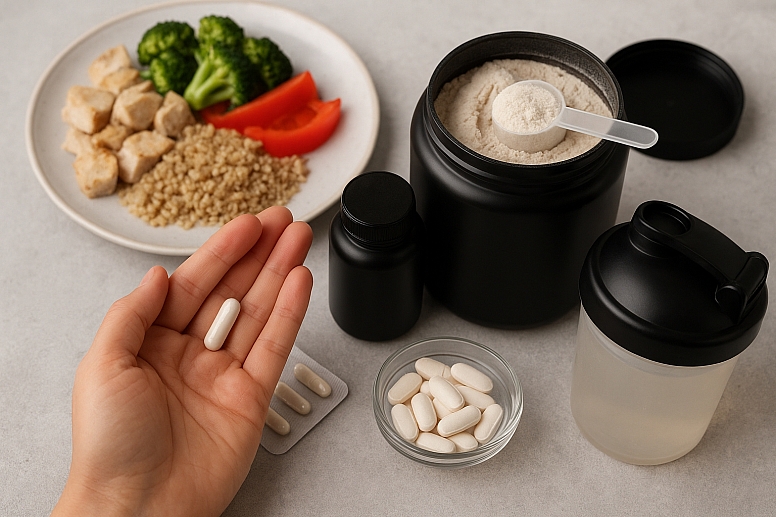
Essential Tips for Choosing the Right Workout Supplements
The fitness world offers countless supplements that promise to boost strength, speed up recovery, and improve endurance. With so many products available, making the right choice can feel overwhelming. Each supplement serves a different purpose, and the effectiveness of any product depends on individual needs, lifestyle, and workout intensity. Understanding your goals and how various nutrients interact with your body helps you make informed decisions. This guide explores the main factors to think about when selecting supplements, helping you align your choices with your fitness journey and long-term wellbeing.
Identify Your Specific Fitness Goals
Every fitness goal requires a unique nutritional approach. Someone aiming for muscle gain will need a different combination of supplements than someone training for endurance or weight management. Protein powders, creatine, and branched-chain amino acids (BCAAs) are popular among those seeking muscle growth, while pre-workouts and electrolyte blends support energy and hydration for endurance athletes. Health experts suggest exploring your options to help match your supplement choices with your desired results. Defining your objectives first helps narrow down the choices and prevents unnecessary spending on supplements that may not align with your body’s needs.
Understand the Role of Macronutrients and Micronutrients
Macronutrients and micronutrients form the backbone of any effective workout nutrition plan. Macronutrients - proteins, carbohydrates, and fats - serve as the body’s main energy sources and are directly tied to performance, recovery, and overall body composition. Protein, for example, supports muscle repair and growth by supplying the amino acids required for rebuilding tissue after training.
People engaged in strength training or high-intensity workouts often benefit from protein supplements such as whey, casein, or plant-based powders, as these help meet daily protein targets that can be difficult to achieve through food alone. Carbohydrates, on the other hand, act as the body’s preferred energy source. They replenish glycogen stores depleted during exercise, preventing fatigue and maintaining endurance during long or demanding sessions.
Complex carbohydrate blends are particularly useful for athletes who train multiple times per day or engage in extended endurance activities. Healthy fats, though often misunderstood, are equally significant. They support hormone production, cushion organs, and aid in the absorption of fat-soluble vitamins such as A, D, E, and K. Including moderate amounts of omega-3 fatty acids from fish oils, flaxseed, or chia supplements can promote joint health and reduce inflammation caused by repetitive movement or heavy lifting.
Micronutrients - vitamins and minerals - operate on a smaller scale yet have an enormous impact on how the body performs and recovers. They regulate countless biochemical processes, from oxygen transport and muscle contraction to immune function and nerve communication. For instance, magnesium contributes to muscle relaxation and prevents cramps, while zinc assists with protein synthesis and immune support.
Vitamin D plays a role in calcium absorption and bone health, an area that is particularly relevant for athletes who engage in high-impact activities. Iron helps transport oxygen throughout the body, ensuring muscles receive enough fuel to perform efficiently. When these nutrients are lacking, performance can plateau or even decline, leading to fatigue, slower recovery, and a higher risk of injury.
Evaluate Ingredient Quality and Purity

Ingredient quality and purity have a major impact on how well a supplement performs. Many fitness enthusiasts focus on the benefits promised on a label but overlook what actually goes into each serving. A supplement’s effectiveness depends not only on its active ingredients but also on the absence of unnecessary fillers, artificial flavors, and preservatives that can interfere with absorption or cause discomfort. Products with a long list of synthetic additives often offer little nutritional value and may lead to bloating, headaches, or digestive irritation. Choosing clean formulations made from recognizable, naturally derived ingredients provides better results and is gentler on the body.
Third-party testing plays a significant role in confirming a product’s authenticity and safety. Independent laboratories verify that what appears on the label matches what is inside the container, checking for contaminants like heavy metals, pesticides, or banned substances. Certifications such as NSF Certified for Sport, Informed Choice, or GMP (Good Manufacturing Practice) indicate that a supplement has met strict quality and safety standards. This kind of verification adds a layer of confidence for athletes and anyone who relies on supplements regularly.
Reading ingredient lists carefully helps you understand how pure and transparent a product truly is. Supplements that list ingredients in clear, measurable amounts show accountability, while proprietary blends can sometimes hide the exact dosages of key nutrients. Transparency matters because it helps you track your intake and avoid overlapping ingredients if you use multiple products. Paying attention to ingredient sourcing can also make a difference; for instance, grass-fed whey, fermented plant proteins, and natural sweeteners such as stevia or monk fruit often indicate a higher-quality product compared to heavily processed alternatives.
Consider Your Dietary Preferences and Restrictions
Fitness supplements should complement your individual dietary habits and not work against them. Every person has unique nutritional needs shaped by lifestyle, ethical choices, and digestive comfort. Those who follow a vegan or vegetarian plan often look for plant-based protein powders derived from sources such as peas, rice, soy, or hemp. These provide a complete amino acid profile without relying on animal products, making them suitable for people who prefer sustainable or cruelty-free options. For individuals with lactose intolerance or dairy sensitivities, whey isolates or lactose-free blends can reduce bloating and discomfort while still providing high-quality protein.
Allergies and intolerances also play a significant role in determining which supplements to include. Many products contain hidden ingredients like soy, gluten, or artificial sweeteners that can cause unpleasant reactions for sensitive users. Reading ingredient labels carefully and researching how products are manufactured helps avoid unexpected allergens. Some companies produce hypoallergenic supplements made in controlled facilities to prevent cross-contamination, which can be especially helpful for those with multiple food sensitivities.
Beyond allergies, certain dietary philosophies or medical conditions may require more thoughtful selection. For instance, individuals following a ketogenic approach might prefer supplements with minimal carbohydrates, focusing on electrolyte powders and MCT oils that support energy levels without disrupting ketosis. People managing conditions like diabetes need to monitor sugar content closely, opting for supplements that use natural or non-caloric sweeteners. Those aiming to lose weight may benefit from low-calorie or nutrient-dense formulations that provide nourishment without unnecessary fillers.
Research the Timing and Dosage of Supplements
Even the best supplement loses its potential when taken at the wrong time or in the wrong amount. Pre-workout products should be consumed around 30 minutes before exercise to improve focus and endurance. Post-workout recovery drinks work best when taken soon after training, replenishing glycogen and supporting muscle repair.
Understanding dosage recommendations prevents waste and reduces the risk of adverse effects. Taking too much of a stimulant-based pre-workout or overusing protein powders may cause restlessness, digestive issues, or dehydration. Consistency, moderation, and proper timing enhance the benefits and create steady progress over time.
Assess the Credibility of the Brand
The supplement industry includes many brands that differ in quality, safety, and reliability. Trusted brands usually disclose their ingredient sources, follow manufacturing standards, and comply with regulatory guidelines. Checking customer reviews and expert opinions gives insight into a product’s effectiveness and safety.
Brands with a history of transparency and quality assurance often maintain better reputations among athletes and trainers. Avoiding products with vague ingredient lists or exaggerated claims helps prevent disappointment or potential harm. Choosing from well-established companies safeguards your health and supports long-term results.
Monitor How Your Body Responds
Each person reacts differently to supplements, even those with identical training goals. Paying attention to how your body feels after taking a new product helps gauge its suitability. Signs of improvement may include better recovery times, sustained energy, or improved endurance. Unwanted reactions like headaches, bloating, or disrupted sleep indicate that a product may not suit your system.
Keeping a training and supplement log helps identify patterns and fine-tune your intake. Adjusting dosage or switching to a different formulation can optimize outcomes without overloading the body. Listening to your body creates a balanced approach that promotes steady progress.
Seek Professional Guidance
Fitness and nutrition professionals can offer personalized advice based on your goals, medical history, and daily routine. A certified trainer or dietitian understands how supplements interact with specific training methods and dietary habits. Consulting experts helps avoid potential nutrient imbalances or contraindications with medications.
Professional input can also guide you through product comparisons, dosage adjustments, and safe combinations. This type of support provides confidence in your supplement plan and encourages sustainable results grounded in scientific understanding rather than marketing claims.
Stay Consistent and Reassess Your Needs
Supplementation works best when paired with consistent effort in training, rest, and nutrition. Skipping doses or changing products too frequently prevents you from noticing real progress. Consistency helps track outcomes accurately and build a rhythm that aligns with your workout routine.
Over time, fitness goals evolve. A person focused on muscle gain might shift toward endurance or maintenance, requiring adjustments in supplement types and dosages. Periodically reassessing your plan keeps it aligned with your body’s current demands and prevents dependency on unnecessary products.
Choosing the right workout supplements is a personal journey shaped by goals, body type, and lifestyle. Understanding nutritional foundations, evaluating ingredient quality, and paying attention to timing create a solid base for success. Reliable brands, professional advice, and consistent monitoring keep your supplement strategy safe and effective. By aligning your choices with your unique objectives and staying open to adjustments, you create a long-term approach that supports steady improvement and lasting performance.









